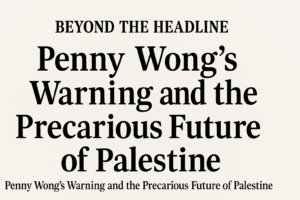Beyond the Headline: Penny Wong’s Warning and the Precarious Future of Palestine
Australian Foreign Minister Penny Wong issued a stark warning: without immediate international pressure for a two-state solution, there may soon be “no Palestine left to recognise.” This chilling statement underscores the accelerating physical and political erosion of Palestinian territory, with Israel now controlling 75% of devastated Gaza and humanitarian catastrophe deepening. While Australia affirms Palestinian statehood recognition is a matter of “when, not if,” Wong stressed its viability hinges entirely on creating a credible pathway now.
Prime Minister Albanese reinforced support for a two-state solution in talks with Palestinian leader Abbas, urging aid access and hostage releases. As allies like Canada and France prepare UN recognition moves, domestic critics argue it could reward Hamas. Ultimately, Wong frames inaction as risking irreversible loss – where the very possibility of Palestinian self-determination and lasting peace vanishes alongside the land.

Beyond the Headline: Penny Wong’s Warning and the Precarious Future of Palestine
Australian Foreign Minister Penny Wong’s stark warning cuts through the diplomatic noise: “There is a risk there will be no Palestine left to recognise.” This isn’t mere hyperbole; it’s a chilling assessment of the potential endgame unfolding in Gaza and the West Bank, demanding urgent international reckoning. Her statement, delivered amidst escalating global concern over the war, underscores a critical shift in Australia’s position and a desperate plea for action.
The Context of Crisis:
Prime Minister Anthony Albanese’s recent call with Palestinian Authority President Mahmoud Abbas reinforced Australia’s stated commitment to a two-state solution. Albanese emphasised humanitarian aid access and the release of hostages held by Hamas. Yet, these necessary steps feel increasingly insufficient against the backdrop of devastation:
- Physical Erasure: Israel now controls approximately 75% of Gaza, a territory largely reduced to rubble. The staggering human cost – cited in the report as 60,000 lives lost, including countless women and children – paints a grim picture of societal collapse.
- Humanitarian Catastrophe: Reports of starvation and crippled aid flows persist, despite international outrage and denials from Israeli leadership.
- Political Vacuum: Hamas’s control of Gaza and the weakened state of the Palestinian Authority complicate any clear path forward. Netanyahu’s stated war aims – defeating Hamas, freeing hostages, and eliminating Gaza’s threat to Israel – offer little room for Palestinian self-determination.
Wong’s Warning: The Stakes of Inaction:
Wong’s core message transcends the immediate ceasefire calls. It highlights a terrifying possibility: that continued Israeli military operations, settlement expansion in the West Bank, and the lack of a viable political horizon could render the very concept of a contiguous, sovereign Palestinian state physically and politically impossible.
Her declaration that Australia’s recognition of Palestine is a matter of “when, not if” signals a significant policy evolution. However, she directly links the viability of that recognition to immediate international pressure for a two-state solution. The implication is clear: delay or half-measures risk making recognition an empty gesture towards a non-existent entity.
The International Crossroads & Domestic Debate:
Australia’s position aligns with allies like Canada and France, who plan to recognise Palestine at the upcoming UN General Assembly. This collective move reflects growing global impatience with the status quo and the need to inject momentum towards statehood.
Domestically, the move faces criticism. Opposition figures like Julian Leeser argue recognition now would “reward Hamas” and send dangerous signals, despite his personal support for a two-state solution. This highlights the complex political tightrope: balancing the urgent need for a political solution with legitimate security concerns about Hamas’s role.
The Human Insight: Beyond Geopolitics
Wong’s warning resonates because it speaks to a fundamental human truth: the right to exist, to self-determination, and to a future. The prospect of “no Palestine left to recognise” isn’t just a geopolitical failure; it represents the potential extinguishing of national aspirations for millions, compounding an already profound human tragedy.
The international community faces a stark choice:
- Act Decisively: Use all diplomatic and economic leverage to demand an immediate ceasefire, surge humanitarian aid, and restart meaningful negotiations based on the 1967 borders with agreed land swaps. This requires genuine pressure on all parties, including Israel regarding settlements and military action, and the Palestinian leadership regarding governance and rejection of violence.
- Risk Irrelevance: Allow the current trajectory to continue, potentially leading to the de facto annexation of Palestinian territory, permanent displacement, and the collapse of the two-state paradigm – a scenario Wong warns could leave nothing viable to recognise.
Conclusion: A Race Against Time
Penny Wong has framed Australia’s potential recognition of Palestine not as an end goal, but as a dependent variable on the international community’s current actions. Her warning is a sobering reminder that the two-state solution isn’t merely stalled; it is actively being eroded on the ground.
The window for a just and lasting peace, built on mutual recognition and security for both Israelis and Palestinians, is rapidly closing. The question is no longer just if Palestine will be recognised, but whether there will be a Palestine left with the territorial integrity and political coherence to make that recognition meaningful. The time for robust, unified international action to forge a pathway to statehood is not tomorrow – it is now. The alternative, as Wong starkly outlined, may be an irreversible loss.
You must be logged in to post a comment.